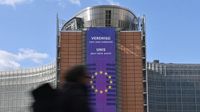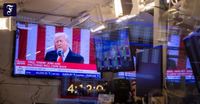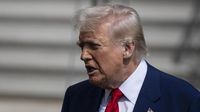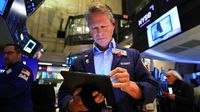On April 8, 2025, American stock markets rebounded significantly after a weak start to the week, with the S&P 500 rising by more than 3 percent, alongside increases in the Nasdaq and Dow Jones. Tech giant Apple saw its share price rise over 4 percent, recovering from a 19 percent drop in the three days following President Donald Trump's announcement of new tariffs, which had particularly affected the company due to its reliance on Chinese manufacturing. Similarly, shares of AI chipmaker Nvidia and internet company Meta surged by more than 5 percent.
Meanwhile, the German index DAX also experienced a recovery, climbing 3 percent after only slight gains in morning trading. Among the biggest winners were Siemens, whose stock rose over 7 percent, Deutsche Bank, which increased by 5 percent, and defense contractor Rheinmetall, up 6 percent. Other European markets mirrored this recovery, with the Japanese Nikkei index gaining more than 6 percent earlier in the day.
In the wake of escalating trade tensions, Trump announced plans to impose additional tariffs of 50 percent on Chinese imports if China did not retract its own tariffs of 34 percent on U.S. products by noon on April 8. This ultimatum, shared on his platform Truth Social, came with a declaration that all talks with China regarding their desired meetings would be canceled if they failed to comply. The Chinese government responded defiantly, labeling Trump's threats as unilateralism and economic bullying. Liu Pengyu, a spokesperson for the Chinese embassy, stated, "If the United States insists on enforcing its will, China will fight to the end."
As the trade war escalates, the European Union has reacted by warning of potential retaliatory measures against the U.S., with Commission President Ursula von der Leyen emphasizing the shared responsibility of China and Europe in maintaining a fair global trade system. In a recent phone call with Chinese Prime Minister Li Qiang, von der Leyen stressed the importance of avoiding further escalation and finding a negotiated solution. The EU fears that increased tariffs could lead to a flood of cheap Chinese products into European markets, undermining local industries.
In the U.S., there is growing concern that Trump's tariff policies may have already pushed the country towards recession. Jörg Kukies, Germany's finance minister, warned that U.S. tariffs could lead to a 15 percent drop in German exports to the U.S., significantly impacting growth prospects and increasing recession risks. He noted, "There are no winners in this trade conflict, and the reactions from American companies indicate that recession fears are rising in the U.S. as well."
Despite the turmoil, there are signs of negotiation efforts. U.S. Treasury Secretary Scott Bessent announced the initiation of trade talks with Japan regarding tariffs, with discussions expected to cover both tariffs and currency exchange rates between the dollar and yen. However, Trump has rejected the EU's proposal to eliminate tariffs on industrial goods, insisting instead that European nations must increase their energy imports from the U.S. to address the trade deficit.
In a broader context, the global financial markets are experiencing significant volatility due to these trade tensions. The Helaba experts noted, "The financial markets around the globe are in turmoil," reflecting fears that the extensive tariff packages could adversely affect the world economy. The DAX index, which had lost substantial ground in previous days, showed signs of recovery, starting the day 1.2 percent higher at 20,039 points.
Amidst these developments, Tesla CEO Elon Musk reportedly attempted to persuade Trump to reconsider the tariffs, highlighting a growing rift between the president and some of his previous supporters. The White House, however, has maintained a firm stance against any suspension of the tariffs, despite market pressures.
The EU has also been cautious in its response to Trump's demands for increased gas imports, stating that it aims to avoid over-reliance on any single supplier. EU officials have indicated that they are negotiating with multiple partners to ensure a diverse energy supply, learning from past dependencies on Russia.
As the situation evolves, various stakeholders are preparing for further negotiations. Countries within the Association of Southeast Asian Nations (ASEAN) are seeking to negotiate lower import surcharges with the U.S. to mitigate the impact of the tariffs. For instance, Vietnam plans to engage in discussions with the U.S. to achieve a sustainable trade balance.
Meanwhile, the EU is preparing to vote on a list of U.S. goods that may face additional tariffs of up to 25 percent, which includes agricultural products, textiles, and cosmetics. This list, however, notably excludes American whiskey, following lobbying efforts from wine-exporting countries like France and Italy.
As tensions continue to rise, analysts are advising caution. The Federal Association of the German Confectionery Industry has expressed concern over potential EU tariffs on U.S. almonds, emphasizing the need for careful consideration of the impact on local industries.
In summary, the escalating trade conflict between the U.S. and China, coupled with Trump's aggressive tariff strategy, is creating widespread uncertainty in global markets. As stakeholders on both sides prepare for potential negotiations, the outcome remains uncertain, with significant implications for international trade dynamics.









